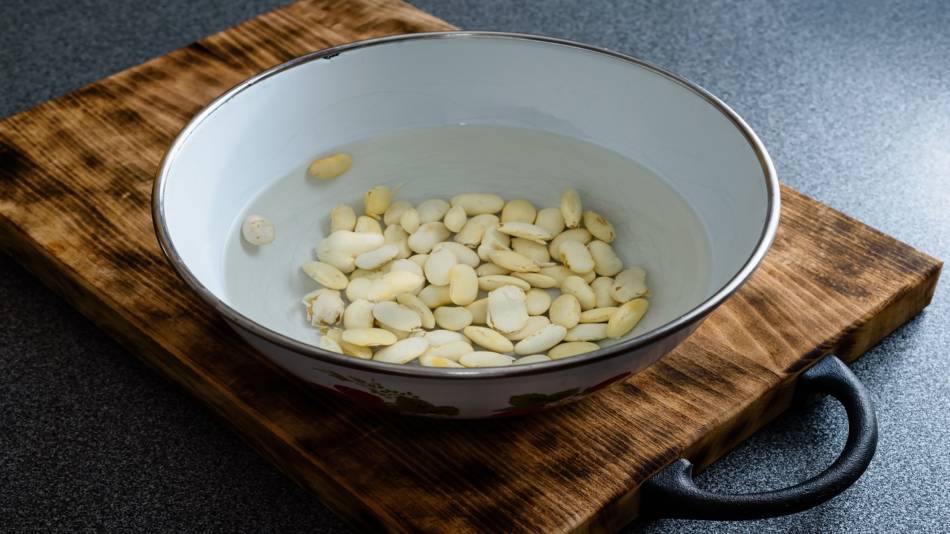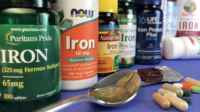Our Members Asked:
I've heard that soaking dried beans for 24 hours reduces the phytate level, allowing for greater access to nutrients. Is this true?

Answer:
Beans, other legumes, and some other plant-based foods contain "antinutrient" compounds, such as phytate, that can limit, by as much as 50%, the body's absorption of nutrients such as iron, zinc, and calcium from these foods. Research suggests that this effect may only be a health concern when a high phytate diet is combined with a deficiency in trace elements (Pires, Front Chem 2023), but if you are concerned about the effects of phytate, soaking can help reduce the amount — although soaking some foods, or soaking too long, may lead to a net loss of nutrients. There is also preliminary evidence that adding certain vegetables or fruits to beans during cooking might increase the bioavailability of nutrients in beans, as described below.
Another potentially problematic group of compounds in beans and legumes, as well as in cereals, rice, potatoes, and certain other vegetables is lectins. If consumed in large amounts, lectins can cause nutrient deficits, gastrointestinal illness, allergic reactions, autoimmune disorders, inflammation, and even death (Urugo, Int J Food Sci 2023). Fortunately, most lectins can be inactivated by following appropriate cooking and soaking methods.
Sign in as a member to learn more, including which foods to soak or not soak, as well as how long to soak to reduce phytate, or soak and boil to remove lectins.
Join today to unlock all member benefits including full access to all CL Answers and over 1,400 reviews.
Join NowAlready a member? Sign In Here.
Join now at www.consumerlab.com/join/









beatrice18650
February 06, 2024do I need to soak macadamia nuts for lectins or phytates?
 ConsumerLab.com
ConsumerLab.com
February 21, 2024We've added information about macadamia nuts to the following section of our article: https://www.consumerlab.com/answers/ive-heard-that-soaking-dried-beans-for-24-hours-reduces-the-phytate-level-allowing-for-greater-access-to-nutrients-is-this-true/soaking-beans-phytate/#macadamia-phytate
Reply to this post…
Michael18647
February 06, 2024What about frozen green soy beans (edamame, mukamame)? The instructions on the bag recommend only a brief cooking time (4-6 minutes). Is this sufficient to negate any anti-nutrient effects?
 ConsumerLab.com
ConsumerLab.com
February 22, 2024We've added information about dried soybeans and edamame to the following section of our article: https://www.consumerlab.com/answers/ive-heard-that-soaking-dried-beans-for-24-hours-reduces-the-phytate-level-allowing-for-greater-access-to-nutrients-is-this-true/soaking-beans-phytate/#soybeans
Reply to this post…
Barbara18632
February 05, 2024I put lentils in a weekly dish I cook. I put it on slow simmer for two hours. We have not had a problem. I have cooked this dish for over 25 years.
Reply to this post…
Deborah18617
February 04, 2024Isn't there a difference between the reaction of white rice vs. brown rice to rinsing and soaking? Since white rice is enriched by adding nutrients to the surface, it makes sense that these nutrients would be reduced by rinsing or soaking. However, according to the NIH, soaking brown rice increases the bioavailability of some of the nutrients. Is your recommendation not to rinse nor soak rice only referring to white rice?
 ConsumerLab.com
ConsumerLab.com
February 22, 2024We've added a bit more detail to the following section of our article to help answer your question: https://www.consumerlab.com/answers/ive-heard-that-soaking-dried-beans-for-24-hours-reduces-the-phytate-level-allowing-for-greater-access-to-nutrients-is-this-true/soaking-beans-phytate/#rice
Reply to this post…
Stan18582
February 02, 2024Since many people are tending tiwards plant-based diets t(hat include nuts s% eeds as well as peanuts and other legumes) , what is your take n this : :People who regularly consume high amounts of phytic acid — such as vegetarians and vegans — can benefit from eating mineral-absorbing enhancers like garlic and onions. These foods increase the absorption of minerals like iron and zinc” ALso, do roasted peanuts and nuts have less lectins and phytic acid?
 ConsumerLab.com
ConsumerLab.com
February 22, 2024Great questions! We've added information about whether foods such as garlic or onions can enhance the bioavailability of nutrients in the following section of our article: https://www.consumerlab.com/answers/ive-heard-that-soaking-dried-beans-for-24-hours-reduces-the-phytate-level-allowing-for-greater-access-to-nutrients-is-this-true/soaking-beans-phytate/#bioavailability-enhancers
Also, we've added information about the amount of phytates and lectins in nuts to the following section of our article: https://www.consumerlab.com/answers/ive-heard-that-soaking-dried-beans-for-24-hours-reduces-the-phytate-level-allowing-for-greater-access-to-nutrients-is-this-true/soaking-beans-phytate/#nuts
Reply to this post…
Stan18572
January 31, 2024Would you agree with this statement (i.e. I really enjoy Planter unsalted peanuts): Raw peanuts contained the highest amounts of lectins, but this was significantly reduced with cooking. Both dry and oil roasted peanuts contained very small amounts of lectins, as did peanut flour and peanut butter.
 ConsumerLab.com
ConsumerLab.com
February 06, 2024We've added information about methods for removing lectins from peanuts to the following section of our article: https://www.consumerlab.com/answers/ive-heard-that-soaking-dried-beans-for-24-hours-reduces-the-phytate-level-allowing-for-greater-access-to-nutrients-is-this-true/soaking-beans-phytate/#lectins-in-nuts-and-seeds
Reply to this post…
Sharyn18562
January 30, 2024How about soaking/sprouting nuts or seeds? Is there any benefit or harm in doing that?
 ConsumerLab.com
ConsumerLab.com
February 06, 2024We've added information about possible methods for removing phytate and lectins from nuts and seeds to the following sections of our article:
https://www.consumerlab.com/answers/ive-heard-that-soaking-dried-beans-for-24-hours-reduces-the-phytate-level-allowing-for-greater-access-to-nutrients-is-this-true/soaking-beans-phytate/#phytate-in-nuts-and-seeds
https://www.consumerlab.com/answers/ive-heard-that-soaking-dried-beans-for-24-hours-reduces-the-phytate-level-allowing-for-greater-access-to-nutrients-is-this-true/soaking-beans-phytate/#lectins-in-nuts-and-seeds
Reply to this post…
Theresa18561
January 30, 2024I usually parboil my brown rice for 5 minutes, then drain and change the water and continue cooking (to reduce arsenic levels.) Would that also get rid of nutrients?
 ConsumerLab.com
ConsumerLab.com
February 13, 2024Cooking rice, including brown rice, in excess water can reduce nutrients, although the effect is greater for enriched rice: https://www.consumerlab.com/answers/ive-heard-that-soaking-dried-beans-for-24-hours-reduces-the-phytate-level-allowing-for-greater-access-to-nutrients-is-this-true/soaking-beans-phytate/#rice
Reply to this post…
Mary18559
January 30, 2024What brand of canned beans besides Eden pressure cooks the beans in the can?
I am too lazy to cook my own beans but Eden brand is very expensive. Dr.Gundry says that pressure cooking beans kills most of the lectins and I have noticed that when I eat them I do not get excess gas.
 ConsumerLab.com
ConsumerLab.com
March 26, 2024Please see the following section of our article for details about whether canned beans need to be soaked or cooked to remove phytate or lectins: https://www.consumerlab.com/answers/ive-heard-that-soaking-dried-beans-for-24-hours-reduces-the-phytate-level-allowing-for-greater-access-to-nutrients-is-this-true/soaking-beans-phytate/#canned-beans
Reply to this post…
Christina18553
January 29, 2024If you don't soak beans for the recommended time, do the phytates also reduce the amount of nutrients you can absorb from other food you're eating at the same meal, eg, the Ca in a glass of milk? And if so, how long does that effect last after eating?
Thank you.
Reply to this post…
beatrice18550
January 29, 2024You provide such valuable information, thank you for keeping us healthy
Reply to this post…
Jeffrey18544
January 28, 2024When I soak beans overnight, I find that most of the water has been absorbed by the beans. I do discard what is left, rinse, then use fresh water to cool.
However it seems that it isn’t removing much of the contaminants if it soaked into the beans????
Any thoughts?
Reply to this post…
Lea18543
January 28, 2024If I am using canned beans, do I need to drain and rinse them (as the can says, but it seems that we are losing flavor & possibly nutrients)? Thank you.
 ConsumerLab.com
ConsumerLab.com
March 26, 2024Please see the following section of our article for information about whether canned beans need to be soaked to remove phytate or lectin: https://www.consumerlab.com/answers/ive-heard-that-soaking-dried-beans-for-24-hours-reduces-the-phytate-level-allowing-for-greater-access-to-nutrients-is-this-true/soaking-beans-phytate/#canned-beans
Keep in in mind that soaking canned beans may be beneficial for reducing sodium content.
Reply to this post…
Adrienne18535
January 28, 2024We consume chick pea pasta and occasionally cheezies made from chick peas. Does anyone happen to know if the chick peas are soaked as a part of the manufacturing processs? I guess I need to make a call to the manufacturers!
Reply to this post…
Mary18533
January 27, 2024What about lentils? I've never heard that lentils need soaking.
 ConsumerLab.com
ConsumerLab.com
January 30, 2024Information about whether lentils need to be soaked to remove phytate and/or lectins can be found in the following sections of our article:
https://www.consumerlab.com/answers/ive-heard-that-soaking-dried-beans-for-24-hours-reduces-the-phytate-level-allowing-for-greater-access-to-nutrients-is-this-true/soaking-beans-phytate/#phytate-lentils-split-peas
https://www.consumerlab.com/answers/ive-heard-that-soaking-dried-beans-for-24-hours-reduces-the-phytate-level-allowing-for-greater-access-to-nutrients-is-this-true/soaking-beans-phytate/#lectins-lentils-split-peas
Reply to this post…
Sharyn18529
January 27, 2024What about soaking nuts and seeds, such as almonds, walnuts, and sunflower seeds. Does that decrease the phytates? Does it also decrease nutrients?
 ConsumerLab.com
ConsumerLab.com
February 08, 2024We've included information about phytate levels in seeds and nuts in the following section of our article: https://www.consumerlab.com/answers/ive-heard-that-soaking-dried-beans-for-24-hours-reduces-the-phytate-level-allowing-for-greater-access-to-nutrients-is-this-true/soaking-beans-phytate/#phytate-in-nuts-and-seeds
Reply to this post…
Charles18527
January 27, 2024I soak all my beans overnight, but what about using a pressure cooker which generally cooks beans between 20 and 30 minutes.? Thank you for your service.
 ConsumerLab.com
ConsumerLab.com
January 30, 2024Please see the following section of our article: https://www.consumerlab.com/answers/ive-heard-that-soaking-dried-beans-for-24-hours-reduces-the-phytate-level-allowing-for-greater-access-to-nutrients-is-this-true/soaking-beans-phytate/#cooking-method
Reply to this post…
bob18525
January 27, 2024Do you recommend soaking split green peas before cooking?
 ConsumerLab.com
ConsumerLab.com
January 30, 2024Information about whether split peas need to be soaked to remove phytate and/or lectins can be found in the following sections of our article:
https://www.consumerlab.com/answers/ive-heard-that-soaking-dried-beans-for-24-hours-reduces-the-phytate-level-allowing-for-greater-access-to-nutrients-is-this-true/soaking-beans-phytate/#phytate-lentils-split-peas
https://www.consumerlab.com/answers/ive-heard-that-soaking-dried-beans-for-24-hours-reduces-the-phytate-level-allowing-for-greater-access-to-nutrients-is-this-true/soaking-beans-phytate/#lectins-lentils-split-peas
Reply to this post…
Ed18524
January 27, 2024Looks like I need hypertext links in my recipes for all this excellent research and lucid conversation. Gratitude to all!
Reply to this post…
Melanie18518
January 26, 2024What about store bought hummus, made with chickpeas? How do we know if they have been cooked properly? I am looking at Cedar's brands label and it says organic steamed chickpeas.
Reply to this post…
Dorothy18517
January 26, 2024I am curious about the many recipes for homemade falafel which most commonly instructs to soak chickpeas/garbonzos but not cook them. Any information about that? I love falafel and hummus, both of which are bean-based and have similar preparation instructions.
Reply to this post…
Shaun18512
January 26, 2024So reccomended soaking directions holds true for dry lentils & dry split peas?
 ConsumerLab.com
ConsumerLab.com
January 30, 2024Information about whether lentils or split peas need to be soaked to remove phytate and/or lectins can be found in the following sections of our article:
https://www.consumerlab.com/answers/ive-heard-that-soaking-dried-beans-for-24-hours-reduces-the-phytate-level-allowing-for-greater-access-to-nutrients-is-this-true/soaking-beans-phytate/#phytate-lentils-split-peas
https://www.consumerlab.com/answers/ive-heard-that-soaking-dried-beans-for-24-hours-reduces-the-phytate-level-allowing-for-greater-access-to-nutrients-is-this-true/soaking-beans-phytate/#lectins-lentils-split-peas
Reply to this post…
Ann Louise18511
January 26, 2024Phytates do have some major positives.
 ConsumerLab.com
ConsumerLab.com
January 30, 2024We've added information about possible health benefits of phytates to the following section of our article, although, as we note, the evidence does not prove cause-and-effect: https://www.consumerlab.com/answers/ive-heard-that-soaking-dried-beans-for-24-hours-reduces-the-phytate-level-allowing-for-greater-access-to-nutrients-is-this-true/soaking-beans-phytate/#benefits
Reply to this post…
Theresa18509
January 26, 2024Do you soaking recommendations also apply to legumes that are small and cook quickly, such as mung beans, split peas or lentils?
 ConsumerLab.com
ConsumerLab.com
January 30, 2024Information about whether small legumes, such as lentils or split peas, need to be soaked to remove phytate and/or lectins can be found in the following sections of our article:
https://www.consumerlab.com/answers/ive-heard-that-soaking-dried-beans-for-24-hours-reduces-the-phytate-level-allowing-for-greater-access-to-nutrients-is-this-true/soaking-beans-phytate/#phytate-lentils-split-peas
https://www.consumerlab.com/answers/ive-heard-that-soaking-dried-beans-for-24-hours-reduces-the-phytate-level-allowing-for-greater-access-to-nutrients-is-this-true/soaking-beans-phytate/#lectins-lentils-split-peas
Reply to this post…
Beverly8398
December 28, 2017I would like to point out that deficiencies of iron, zinc, and calcium due to phytates are unlikely to occur in most people living in developed countries and eating a varied diet.
The deficiencies are common in populations whose diet (often due to famine, drought, poverty, refuge status) consists almost entirely of a single high-phytate food, supplemented, if at all, with small amounts of just a few other foods. Much of the research I've seen has been done to address this problem.
Although soaking beans in a particular way might be important for people who have reason to pay special attention to their intake of those minerals, my personal experience leads me to think that a healthy person with a varied diet does not have to worry about doing so.
I eat a serving of beans (cooked in their soaking water), a handful of nuts, and one to three servings of whole grains every day, and according to my blood tests am not even borderline deficient in iron, zinc, or calcium. (Besides fruits and veg, I eat a little dairy, occasional fish, but no other meat.)
I thought this might ease some minds.
Annie
January 27, 2023Thank you. This was helpful. Cause I want to eat that way myself
Reply to this post…
Alex8395
August 23, 2017When you say it's not worth soaking grains, does this extend to quinoa and buckwheat too?
 ConsumerLab.com
ConsumerLab.com
August 24, 2017Hi Alex - Soaking may reduce phytates in quinoa, but there does not appear to be any studies on whether this causes significant nutrient loss, or on the effects of soaking on phytates and nutrients in buckwheat.
Dawn18560
January 30, 2024Well, the last 3 bullets concerning the BENEFITS of dietary phytates is really confounding. I don't know what to make of it.
Reply to this post…
Alex8393
August 23, 2017Aren't the complex sugars part of the benefit of beans?
 ConsumerLab.com
ConsumerLab.com
August 24, 2017Hi Alex - Complex sugars found in beans cannot be digested by humans and cause flatulence, so soaking can reduce that.
Reply to this post…
Helen8391
August 23, 2017I have read that pressure cooking dry beans without soaking improves their nutrition. But one would not be removing the water, actually using less water.
Is there any research on the effects of pressure cooking?
Thank you.
 ConsumerLab.com
ConsumerLab.com
August 24, 2017Hi Helen - This study on moth beans showed very little phytate reduction from pressure cooking alone (http://onlinelibrary.wiley.com/wol1/doi/10.1111/j.1365-2621.1986.tb13887.x/abstract), although there does not appear to be research on the effects of pressure cooking on other types of beans.
Reply to this post…
david8389
August 23, 2017do the canned beans have to be soaked
 ConsumerLab.com
ConsumerLab.com
August 24, 2017Hi David - Thank you for your question. We've now added information about canned beans and phytate levels in the answer above.
Reply to this post…
Roddy8387
August 23, 2017I thought soaking rice is one of the ways to lower the arsenic level. But you are saying not to soak rice because it will cause loss of nutrients. So what is the deal, to soak or not to soak?
 ConsumerLab.com
ConsumerLab.com
August 24, 2017Hi Roddy - While soaking may reduce arsenic, it also severely reduces the nutrient content. Cooking rice in a high ratio of water to rice also lowers the arsenic level (http://pubs.rsc.org/-/content/articlehtml/2009/em/b816906c).
Glenn18508
January 26, 2024It is primarily brown rice that has the arsenic problem. Another way to reduce arsenic is to cook the brown rice for 5 minutes, then drain the water, then continue to cook with fresh water. Supposedly this reduces arsenic by 75%. Our rice cooker calls for water to rice ratio of 1.25 to 1. We do the 5 minute precook on the stove, then continue with the rice cooker but with a ratio of 1 to 1. Perfect every time.
Mark18526
January 27, 2024Your response implies that some of the arsenic is removed by the steam during cooking. Is that correct? If not, how can the amount of water used in boiling affect arsenic levels of the cooked rice? The link you provided doesn’t seem to work.
Reply to this post…
Barbara8385
August 15, 2017Are canned beans pre-soaked before cooking? I have read that the antioxidant value of canned beans is higher than cooked unless steamed or pressure cooked. Thanks.
 ConsumerLab.com
ConsumerLab.com
August 24, 2017Hi Barbara - We've added information about processing methods (which can vary) and phytate levels in canned beans in the answer above.
Reply to this post…
Deborah8381
August 13, 2017I love the information I get from Consumer Labs. FYI, I never buy a product unless it's been rated by CL.
My question is.... I'm an incredibly lazy, spontaneous meal preparer. Do you know if canned beans have had the antinutrient phytate soaked out of them? Thank you.
 ConsumerLab.com
ConsumerLab.com
August 24, 2017Thank you for your kind words, Deborah. We've now added information about phytate levels in canned beans to the answer above.
Deborah8383
August 27, 2017Bravo! Just the information I needed. As always, CL is the place to go, to be in the know. Thank you Consumer Lab.
 ConsumerLab.com
ConsumerLab.com
August 28, 2017Thank you Deborah! We're glad this was helpful for you.
Reply to this post…
Robin8379
June 21, 2017I buy (dried) sprouted lentils, because they're supposed to be more digestible and nutritious. Since pre-soaking is part of the sprouting process, I'm guessing that no further soaking is needed to remove phytates from sprouted lentils before cooking them. Any information on this?
 ConsumerLab.com
ConsumerLab.com
July 06, 2017Hi Robin -- Reduction of phytate occurs during the sprouting process, so no further soaking should be necessary.
Reply to this post…
Sarah8373
June 16, 2017Any idea of there is a minimum about if soaking water necessary to get the benefits of soaking beans?
 ConsumerLab.com
ConsumerLab.com
June 16, 2017Hi Sarah -- Research has been done to find the optimal time, as noted in the full answer, but studies have shown some phytate reduction after 4 hours of soaking.
Sarah8375
June 17, 2017Thanks. But do you know if there any research on the amount of soaking water needed to reduce phytate? As in does 1 cup dry beans need to be soaked in at least 4 cups water etc. for the phytate amount to be reduced. I know not using enough soaking water will keep the beans from releasing some of the "musical" compounds so I was wondering if that applies to the phytate amount as well.
 ConsumerLab.com
ConsumerLab.com
June 18, 2017While there isn't much research specifically on the amount of water that should be used, most of the studies that test bean soaking use between 3 and 5 cups of water for each cup of beans.
Sarah8377
June 18, 2017That does seem to be the standard amount. I hope someday that piece gets tested too. Thanks so much!
Reply to this post…
Michael8370
June 16, 2017How about just cooking the beans for 2 or 3. Days as they do in Mexico and other countries before they mash them into a paste. They don't pre soak them.Does this reduce the phytates and preserve nutritional value .
 ConsumerLab.com
ConsumerLab.com
June 16, 2017If you're not removing the cooking water, you're not removing the phytates.
Ulana8371
January 28, 2022Many years ago, when I lived in Las Cruces, New Mexico as a student, I learned to cook pinto beans which is the predominant bean that is eaten there and in a large part of Mexico (besides black beans).
I have never heard or seen anyone cook beans for two or three days. I myself have been cooking them now for decades and after soaking them overnight and draining the soaking water in the morning. I use a slow cooker to cook them for at most 8 hours or until I get home. I imagine they would turn to mush or completely fall apart to cook them for two or three days besides being very impractical. Many families that I got to know in Las Cruces would regularly have a pot of beans on the stove but I can assure you that they did not cook them for two or three days.
Darienne18552
January 29, 2024Ulana, if the beans do not come to a full boil for 10 minutes you're not destroying the lectins which as in the example above, can cause food poisoning. Start with a 10-minute full boil, then finish in the slow cooker if you prefer. As Rancho Gordo says, boil them "like you mean business"!
Reply to this post…
gloria8368
June 16, 2017There is a substitute for soaking dried beans for hours; it saves a lot of time. I put them in a pot with lots of water, bring to a boil and cook for 2 minutes. Turn off the heat and let them sit for 1-2 hours. After that, drain the water, rinse, and start all over with fresh water to finish cooking the beans. Have done that for years, and assume that it reduces the phytate levels sufficiently, since I have never become ill from them and it does greatly reduce their gas-producing ability as well as soaking. Got this method from an online cooking site. Any comments?
 ConsumerLab.com
ConsumerLab.com
June 16, 2017Hi Gloria - As explained in the full answer above, cooking doesn't remove more phytates than soaking. Also, the phytates won't make you ill but can reduce the nutrients you get from the beans. You might, however, consider soaking first, then cooking in fresh water because by doing the double cooking, you may be losing more nutrients than if you soaked/cooked.
Reply to this post…
Edwin8366
June 14, 2017You comment that it is important to drain the water and use new water to cook the beans to further reduce antinutrient levels. What is the effect of draining the water then cooking in chicken or beef broth? Any added benefit or not?
 ConsumerLab.com
ConsumerLab.com
June 18, 2017Hi Edwin -- It doesn't seem like cooking in broth after soaking and discarding the water has any further benefit.
Reply to this post…
Barbara8363
June 14, 2017I have been rinsing legumes after soaking but with grains, I cook them in the same water after soaking. Maybe this would help preserve the nutrients and the benefits of soaking?
 ConsumerLab.com
ConsumerLab.com
June 14, 2017As noted in our answer to the question above, it's probably not worth soaking grains, Barbara.
Reply to this post…
AARON8354
June 11, 2017What would your advice on oats be, because I've also heard of similar issues with phytates for oats?
 ConsumerLab.com
ConsumerLab.com
June 18, 2017Hi Aaron -- As noted in our answer above, it is probably not worth soaking oats or other grains.
J.Claire8356
May 20, 2020I pressure cook whole oat groats for breakfast after soaking overnight, and soaking worthwhile in terms of dramatically reducing cooking time.
Reply to this post…
MSV8346
June 11, 2017Thank you so much for the article!
Does anyone know how soaking for sprouting impacts the nutrient level in general (beans, grains, rice)?
I have been soaking (not sprouting) organic brown rice prior to cooking. Is this information also applicable to soaking rice/grains?
Thanks for any comment.
Raphaela8347
June 15, 2017I always soak my grains and nuts following the information on this link: http://traditionalcookingschool.com/2009/07/06/grain-cooking-chart/ I hope it will benefit you too.
 ConsumerLab.com
ConsumerLab.com
June 15, 2017Hi Raphaela - This article doesn’t seem to cite any clinical data, and we haven’t seen any results that support an increase in nutrient absorption from soaking grains.
J8350
June 18, 2017Weston Price says we are supposed to soak grains before eating them...is his data trustworthy?
Also, he does not mention draining the water it's been soaked in and putting it in fresh water before cooking, so always wondered if you're just cooking it in "phytate water".... what do you think?
 ConsumerLab.com
ConsumerLab.com
June 18, 2017Per our answer, soaking grains is probably not worth it because of the nutrient reduction, and yes, replacing the water is important.
Reply to this post…